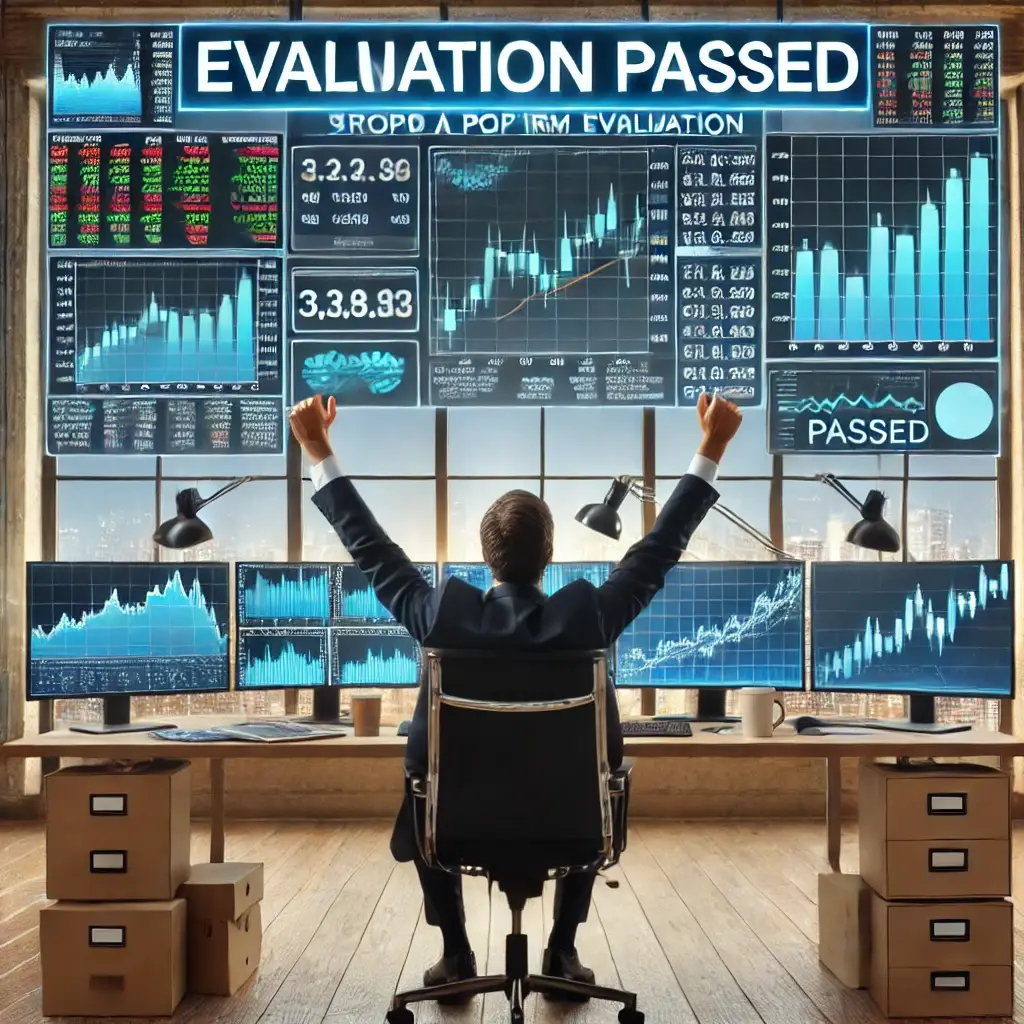Introduction
Breaking into the world of funded trading can seem like an uphill battle, especially when faced with the challenge of passing a prop firm’s evaluation program. Whether you’re an experienced trader looking to scale or a beginner eager to prove your skills, successfully navigating the evaluation phase is crucial to securing a funded account. In this blog post, we’ll break down what prop firm evaluation programs are, why they matter, and provide you with practical insights to help you crush the evaluation process and achieve your trading goals.
Table of Contents
What Are Prop Firm Evaluation Programs and Why Should You Care?
Prop firm evaluation programs are the gateways to funded trading accounts offered by proprietary trading firms. These programs are designed to assess a trader’s skill level, discipline, and consistency before granting access to the firm’s capital. Typically, prop firms offer a two-step evaluation process: the initial evaluation phase, where you need to meet specific profit targets while adhering to strict risk management rules, followed by a verification phase to confirm your abilities.
Why is this important? Passing an evaluation program allows you to trade with the firm’s capital, letting you keep a significant portion of the profits while minimizing your own risk. Whether you’re aiming to scale your trading operation or reduce personal capital exposure, getting through the evaluation phase is a key milestone.

Understanding the Structure of Evaluation Programs
1. The Initial Evaluation Phase: Prove Your Skills
The initial phase of a prop firm evaluation generally involves reaching a predefined profit target within a set number of trading days. It should be noted, this isn’t just about hitting the profit goal—it’s about doing so while demonstrating that you can managing risk effectively. Here’s how to approach it:
Focus on Risk Management: Prop firms prioritize risk management, often setting strict drawdown limits and daily loss caps. Always calculate your position size and risk per trade to ensure you stay within the firm’s guidelines. See Risk Management In Prop Trading.
Stick to Your Strategy: Consistency is key. Whether you’re using a technical or fundamental strategy, avoid the temptation to deviate from your plan. Firms want to see that you can maintain discipline even in volatile markets. See How To Develop A Technical Trading Strategy.
Example: If a firm sets a profit target of 10% with a maximum daily loss of 5%, your focus should be on steady, low-risk gains rather than aiming for home runs. A trader who consistently hits small profits while protecting capital is more likely to pass than one who swings for the fences.
2. The Verification Phase: Prove Your Consistency
After passing the initial phase, you’ll enter the verification phase. This is essentially a confirmation of your trading skills, often with a lower profit target but similar risk management rules. The firm is looking for consistency over time—showing that your performance wasn’t a fluke.
Maintain the Same Approach: Don’t change your strategy just because you’re in the verification phase. Continue using the same disciplined approach that got you through the initial phase.
Manage Your Emotions: At this point, it’s easy to let nerves take over. Stay focused on your process, not the outcome. Emotional discipline is crucial to showing that you can handle the pressures of trading with significant capital. See Mastering The Psychology Of Trading In Prop Firm Challenges.
Example: If you passed the initial phase with steady 1% gains per trade, maintain that approach. Trying to rush through the verification phase with larger positions or riskier trades could jeopardize your progress.
Common Pitfalls to Avoid During the Evaluation Phase
Overtrading
One of the most common mistakes traders make during a prop firm evaluation is overtrading. The pressure to meet profit targets can push traders to take more trades than necessary, increasing their risk exposure and deviating from their strategy.
Solution: Focus on quality over quantity. Stick to your trading plan, and only take trades that align with your strategy. Remember, fewer high-quality trades are better than many low-probability ones.
Ignoring the Drawdown Limit
Many traders fail the evaluation phase by hitting the maximum drawdown limit, which is often stricter than the profit target. Prop firms use this limit to ensure you can manage losses effectively, a critical skill for any successful trader.
Solution: Always keep the drawdown limit in mind. Set alerts or use trading software to track your drawdown and prevent it from surpassing the allowed limit.
Letting Emotions Take Control
Trading under pressure can lead to emotional decisions, which often result in poor performance. Fear of failure or the urge to recover losses can push traders to make irrational trades.
Solution: Practice emotional discipline by sticking to your strategy and risk management plan, regardless of short-term outcomes. Tools like journaling and mindfulness techniques can help you stay centered during challenging trading days.
Suggested links:
How To Manage FOMO.
Practical Tips to Beat The Evaluation Phase
Backtest Your Strategy
Before entering a prop firm evaluation program, thoroughly backtest your trading strategy to ensure it has a high probability of success within the prop firm’s parameters. This will give you confidence that your approach works under similar conditions.
Treat It Like Live Trading
Many traders treat evaluation accounts differently from live accounts, which can lead to reckless behavior. Treat the evaluation phase as if it were live trading, with the same level of focus, discipline, and respect for capital.
Use Tools to Enhance Performance
Leverage trading tools like stop-loss calculators, automated alerts, and journaling apps to help you stay disciplined and adhere to the firm’s rules. These tools can enhance your performance and reduce the likelihood of mistakes.
Another good article written by Funding Traders:
Prop Firm Evaluation Guidelines That Funded Traders Must Follow – FundingTraders Blog
Conclusion
Mastering a prop firm evaluation requires a combination of skill, discipline, and emotional control. By focusing on risk management, maintaining consistency, and avoiding common pitfalls, you’ll significantly improve your chances of passing and securing a funded account.





